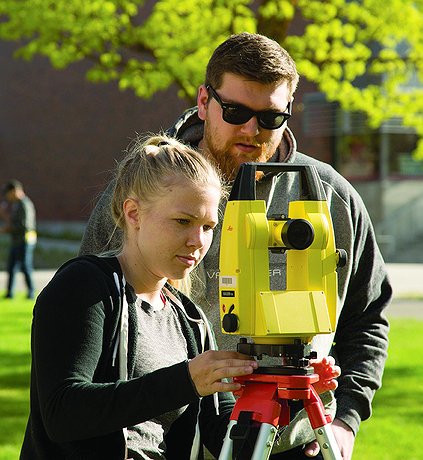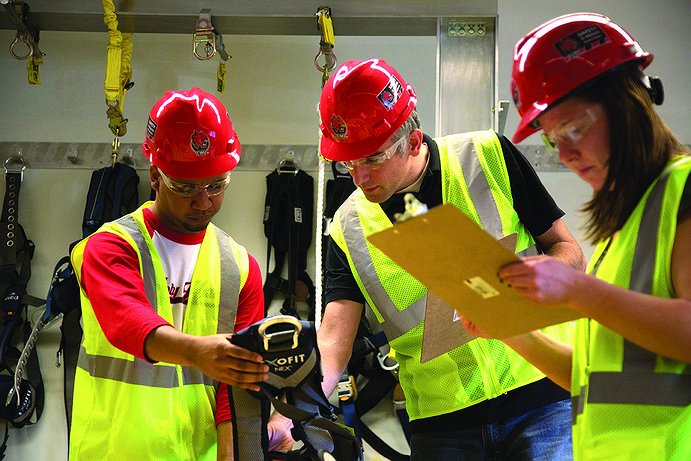CWU Construction Management program is building up the skilled worker base
ELLENSBURG — Jon Hylback grew up around big equipment. His parents owned a nursery business, and he and his dad shared a love of operating tractors, backhoes, and other machines. His dad called it “diesel therapy.”
Halfway into his first year of college, where he’d planned to study pre-law, Hylback had a change of heart. He left school and went to work for several years, first at his parents’ nursery, then to the oil fields of Alaska’s Prudhoe Bay. He was working for a dirt contractor in Washington state when he suddenly realized he was tired of running a shovel.
“I walked up to the superintendent on site and said, ‘Hey, how can I do what you do?’” Hylback said.
The superintendent told him he’d need to go back to school, so Hylback pursued an associate’s degree at a nearby community college. Then, on the recommendation of a family friend in the construction business, he applied and was accepted to CWU’s Construction Management (CM) program.
Now a senior, Hylback has had two internships with the same company. The first had him working in a familiar position as an equipment operator; in the second, he experienced what it felt like to be a superintendent.
Hylback’s trajectory is familiar among CM students. Greg Lyman, chair of the engineering technologies, safety, and construction department, says CWU CM students have an “it factor” that makes them highly desirable in the industry.
“A lot of our students come from blue-collar backgrounds, and they’ve been roofers or have had some other kind of hard labor job,” Lyman said. “They work hard while they’re here, and then they get out with their degree, and they’re just killing it in industry because they’ve not only got the bachelor’s degree and all the knowledge; they also have an amazing work ethic.”
Now, thanks to a Career Launch grant from the Washington Student Achievement Council (WSAC), the CM program is poised to become even more instrumental in training the skilled labor force for the state’s growing construction industry.
Lyman and his colleagues also envision CM becoming a model for other university departments as they look to produce career-ready graduates.
Using Different Tools
Construction management involves planning, budgeting, quality control, and safety of managing any type of construction project. But it’s more than that, says Warren Plugge, the CM program coordinator at Central.
“The industry is really looking for new and upcoming ideas on how to fit in things like management practices—most importantly, the technology component that we deal with on an everyday basis,” he said. “Not just digital technologies, but materials, processes, and how we work with people.”
CM graduates typically start off as field engineers, project engineers, or safety engineers. As they gain experience, they’ll move up through the ranks, becoming a project manager and then, perhaps, joining company leadership.
Central’s CM program is unique because it offers two different tracks: a general option for commercial construction, and a heavy/civil track focused on building roads, bridges, and other types of infrastructure.
“Even though we have two separate focus areas, you’re still dealing with the basic materials we commonly find in construction, namely earthworks, concrete, wood, and steel. You’re just using them a little differently,” Plugge said.
CM is one of the top five “recruiting majors” across the institution, meaning that it draws students to CWU. Sathy Rajendran, dean of the College of Education and Professional Studies (CEPS), says that depending on their goals and experiences once they start taking classes, students may then transition to their “found” major. The CM program has about 150 students currently enrolled.
Smaller class sizes and a low faculty-student ratio contribute to better outcomes for students. Most CM courses also have accompanying labs where students apply what they learn about everything from estimation, scheduling, and digital technologies to materials like soils and concrete.
“That hands-on experience CM students get really creates a well-rounded graduate that can hit the ground running in industry,” Lyman said. “They’re learning estimating with software they would use in industry, and they’re modeling 3D systems with the same software they’ll see later.”
Another distinguishing factor for the program is its requirement that students find a paid internship. In addition to an hourly wage, companies typically provide their interns with living and vehicle expenses.
“A paid internship is a big deal,” Plugge said. “Companies aren’t just hiring students to be free labor. They’re hiring interns to be functioning members within that company structure, so students become members of the overall process. You’re going to be a key member of the team.”
In the summer class that accompanies internships, students produce weekly reports on their activities in the field or office. By the end, they not only have résumé-worthy experience, but also a portfolio. They also do a presentation on their experience for their younger peers, which, in turn, stokes excitement for what lies ahead.
For Plugge, the most gratifying aspect about seeing his students complete internships is their newfound grasp of what they’ve learned in the program.
“They come back using the terminology and language of what we’ve been talking about in construction management classes. They’re more knowledgeable about what happens, and they come in and contribute that to the class,” he said. “I think that, for me, is the most exciting thing about what the internship does—it gives students a much more centered focus on what their intent is, as far as their education and this degree.”
In her first internship, recent grad Marisa Robson (‘24) worked for a Portland-based construction company as a project engineer. Among other duties, she served as a liaison between the architects and builders, attended meetings, and estimated material needs for building sites.
“I didn’t know what to expect going into it, but I fell in love with it,” she said. “I was learning something new every day, and I met so many people from all different backgrounds, different areas in the country, and different countries. It was really amazing.”
Robson completed four more internships with the same company. After she graduated, the company hired her as a project engineer.
The construction industry has been traditionally male-dominated, but that may be changing. In 2023, while women still represented only 10.9% of the workforce, that number represented a more than 50% increase from the previous year.
“People think a degree in construction management means you go out there and swing hammers and build, but there’s so much more to it now, especially with technology,” Robson said.
Nurturing New Talent
The demand for skilled labor is high as the construction sector has shown continuous growth over the past two decades. By 2027, industry earnings are expected to top $2.2 trillion. Perhaps because of this steady growth, the industry has struggled with a shortage of skilled labor.
In response, the construction industry has taken on a greater role in supporting its up-and-coming workers, from offering scholarships and other financial support to providing leads for jobs and internships.
“It’s so easy to get financial assistance, and there are so many construction companies that want to help support students,” Robson said.
The 16-member Industry Advisory Council (IAC) plays an active role in the CM program, providing insights on industry trends and job needs and helping with program advocacy and accreditation.
“We’re here to guide the program to continue to grow and just produce the best students and also share what the industry needs from the students,” said David Kennedy, chair of the IAC.
IAC members also coach student teams preparing for the annual Associated Schools of Construction competition, held in Reno, Nevada. The competition is often the highlight of a CM student’s junior or senior year.
“We do prep sessions, working with students through real-world problems, hearing their presentations and providing mentorship to help them craft their message and learn how to show up in those settings where they’re pitching a true project proposal,” said Chris Lang (’09), vice chair of the IAC.
The industry-university connection delivers a mutual benefit to both students and companies. As a result, the CM program boasts a nearly 100% job placement rate.
Working Across Disciplines
Earlier this year, CEPS, which houses the CM program, received a $160,000 Career Launch grant from WSAC, as part of the Career Connect Washington initiative. By 2030, the initiative aims to have 60% of young adults participating in a program that supplements classroom experience with real work experience, such as paid internships and apprenticeships.
The grant will help the college develop two certificates: one in internship readiness and one in career readiness. Each certificate aims to prepare students for success in the workplace, covering topics like emotionally intelligent leadership, project management, and other high-level skills.
For a program to be eligible for the grant, it needed to include a requirement that every student complete a paid internship or apprenticeship. CM was one of the few programs at Central that fit the bill.
That’s where Rajendran got the idea to use CM as an anchor degree for a larger Allied Construction Careers program.
“I wanted to go with the construction industry as a whole, not only supporting the construction management majors, but the multiple majors within the university that send students to the construction industry,” he said. “We said ‘one industry, one application, multiple degrees, multiple pathways, multiple student population targets.’”
In Rajendran’s vision, Allied Construction degrees will also include programs like safety management, risk insurance, business administration, engineering technology, and IT management.
“We call it a ‘college of choice,’” he said. “We want to be the top program in our discipline in whatever we do, whether it’s an electrical program, construction, IT, or public health. That is our ultimate goal. We want to have construction industries come to Central and have it be like a supermarket, where we have everything you need in one stop.”






